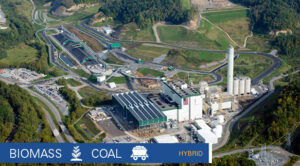
Virginia City Hybrid Energy Center, St. Paul, VA. It survives until at least 2030 and perhaps 2045 in the clean energy legislation. Dominion Photo.
By Steve Haner
Will all of Virginia’s existing fossil fuel electric power plants be closed under Governor Ralph Northam’s new clean energy transition legislation? As we continue our detailed examination of House Bill 1526 (with line references), the answers may surprise some. Not many of them. Not the natural gas plants.
Dominion Energy Virginia has been on a building spree for more than a decade, financing new coal, natural gas and woody biomass generators around the state with “rate adjustment clauses,” specific charged for specific projects. All of them emit carbon dioxide. Monthly bills now include six separate RACs or “riders,” costing residential consumers $12.43 cents for every one thousand kilowatt hours of juice they consume.
Environmental activists disappointed in Governor Ralph Northam’s new clean energy transition legislation were looking for a far quicker retirement of existing fossil fuel generation and a ban on development of any new power plants emitting carbon dioxide or using transported natural gas. They preferred the stronger House Bill 77, more aligned with Green New Deal ideology, which passed one committee but was left in Appropriations to die.
Beginning on line 1284 of the successful bill (House engrossed version) the utilities are instructed to stop burning coal by 2024, except for a plant Dominion shares with the electric cooperatives and the newest Virginia coal plant, built by Dominion in Wise County. But in other proceedings, the utility has reported plans to close its remaining coal and oil units soon without this bill.
There is no mention in the bill of the company’s largest coal plant just across the line in West Virginia, so old it is covered in base rates and not a rider, although earlier versions apparently included language seeking to include it in the coal closure mandate.
All the biomass operations (supported by the smallest of the bill riders) must close by 2028, again with the exception of the Wise County plant, which mixes coal with wood.
Del. Terry Kilgore, R-Gate City, who has been a strong Dominion supporter in past battles, gave a speech in defense of that plant and against this bill on the House floor. That Wise County coal plant can remain open beyond 2030, but only if it installs a successful method to capture and sequester its CO2 emissions (line 1291). That technology does not now exist.
It isn’t until 2045 (see line 1294) that it and all other carbon-emitting plants must close. Dominion may preserve the heart of its new fossil fuel fleet for another two or three decades – the vast majority of their useful lifespans — if it complies with other mandates in the rest of the bill.
That might be good news for ratepayers who must pay for them either way, open or closed. But customers will also watch new rate adjustment clauses (riders) blossom on their bills for the offshore wind, onshore wind, square miles of solar fields and fleets of storage facilities demanded in this bill. With its authority weakened, there is not much the State Corporation Commission can do to prevent construction of excess generation in Dominion’s territory.
New fossil fuel plants are not prohibited in the Governor’s legislation. The bills which passed the Virginia House and Senate Tuesday contain only a temporary moratorium on new fossil fuel generation and lay groundwork for a quick ban. There are three constraints on new fossil fuel plants in the bill.
In the enactment clauses at the end of the omnibus clean energy bill, clause number seven on line 1997 calls for the Northam Administration to prepare a report by January 2022 (note: after the next election) on how to achieve “100 percent carbon free electric energy generation by 2050 at least cost for ratepayers,” including a recommendation on whether to ban further fossil fuel plants. Only after that may the State Corporation Commission approve another fossil fuel plant.
Adding a belt to those suspenders, on line 593 it states that the State Corporation Commission may only approve more gas generation if it is needed for “the reliability and security of electric service,” and if the utility in question is meeting its energy savings goals established in this bill. Finally, there was the late addition by floor amendment of enactment clause 13, starting on line 2031. It reads:
- That by January 1, 2028, if the Secretary of Natural Resources and the Secretary of Commerce and Trade determine that the greenhouse gas reduction targets are not met pursuant to § 10.1-1330, then there shall be a moratorium on the issuance of permits for new fossil fuel fired generating facilities by January 1, 2030.
January 2028 is two governors down the line, and Virginia seems to upend its utility regulation policy between every election. New plants are theoretically possible, but if those three provisions become part of Virginia law, raising outside capital for additional fossil fuel generation is bound to be very difficult. But on close examination, it appears that most of the existing fleet of carbon-emitting plants (including the Dominion-owned coal plant in West Virginia) will continue operations for decades.


